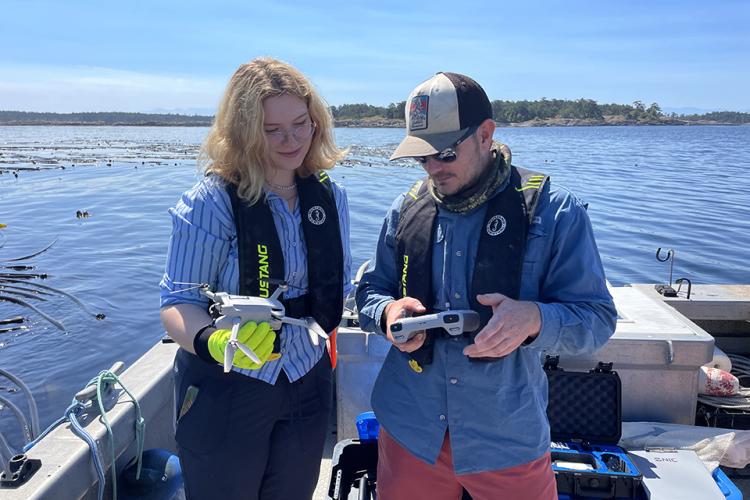Kelp beds are like the forests of the sea, say North Island College researchers working on ways to restore water ecosystems in the area.
NIC's Centre for Applied Research, Technology and Innovation (CARTI) is collaborating with First Nations partners and industry on a project to collect environmental DNA, or eDNA, to detect species presence in areas with kelp and where they have done kelp restoration. This work includes kelp species, as well as fish and invertebrates.
Another CARTI project is using drone technology to map the health of kelp beds at a time when they are under threat.
"If it goes away, we lose all this really important habitat, and then that really affects our local fisheries too," said Logan Zeinert, CARTI senior research technician. "There's some push to increase the habitat that's available."

Abby Walker, a second-year NIC student and research assistant for CARTI, and Logan Zeinert, CARTI senior research technician, conduct drone research on kelp beds.
Kelp beds face threats such as higher water temperatures and a growing population of green sea urchins, which can devour kelp, particularly as their natural predators, such as sea stars, have been on the decline.
Abby Walker, a second-year NIC student from Campbell River, is pursuing an Associate of Science degree. As a research assistant, she has been "wearing a lot of hats" with CARTI the last couple of years on kelp projects.
"I get to do all sorts of amazing, fun projects around the ocean," she said. "I have always wanted to work at something in the ocean It really feels like I'm making a difference."
As an example, she got a drone licence last year and is working on the project with the Kwiakah First Nation to map kelp bed locations.
Kelp is important to promoting healthy, diverse ecosystems in the water. Among other things, the kelp beds can help sequester carbon and mitigate climate concerns such as extreme wave action during storms.
"It's really encouraging larger diversity of species in an area," Zeinert said. "It can make more complex groups of species."
The work to collect eDNA looks at detecting species present in areas where kelp restoration has taken place. When it comes to kelp, the main types in this region are primarily bull kelp and giant kelp, followed by winged kelp and sugar kelp.
In the lab, the CARTI team grows "baby kelp" on rocks to start off, then moves the kelp to the ocean where it is monitored.
"We want to restore kelp forests because kelp is a forest. It is an ecosystem," Walker said. "It is a cornerstone of the aquatic environment, and we really need it."
Over the last few years, CARTI's kelp restoration project with the Wei Wai Kum First Nation and industry partners has aimed to fill in knowledge gaps about kelp and potential for habitat restoration by the forestry sector to reduce logging impact on marine environments. For the project, CARTI received a grant from the Natural Sciences and Engineering Research Council of Canada (NSERC).
"We're currently reapplying for some money for that grant to continue that work because there's interest in restoring the areas that we're working on," Zeinert said.
The hope is to increase the scope of the project looking at techniques to create new habitats at old log dumping sites and mitigate the effects of industry on the marine ecosystem.
"We're looking at a few different ways to remedy that, using kelp," he said.
For more about CARTI and its work, see nic.bc.ca/about-us/research/carti/.










